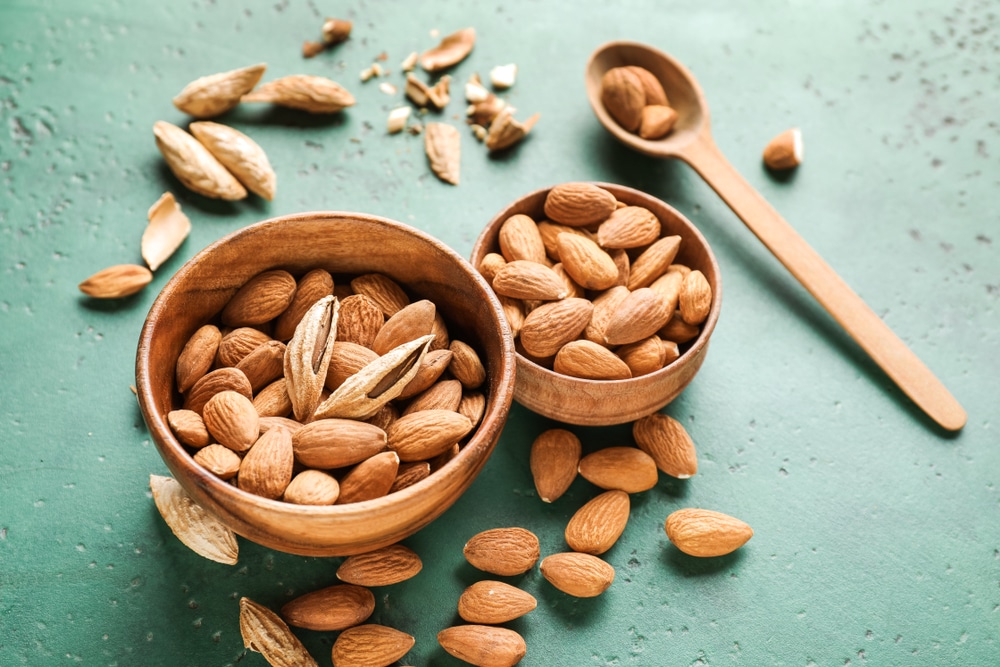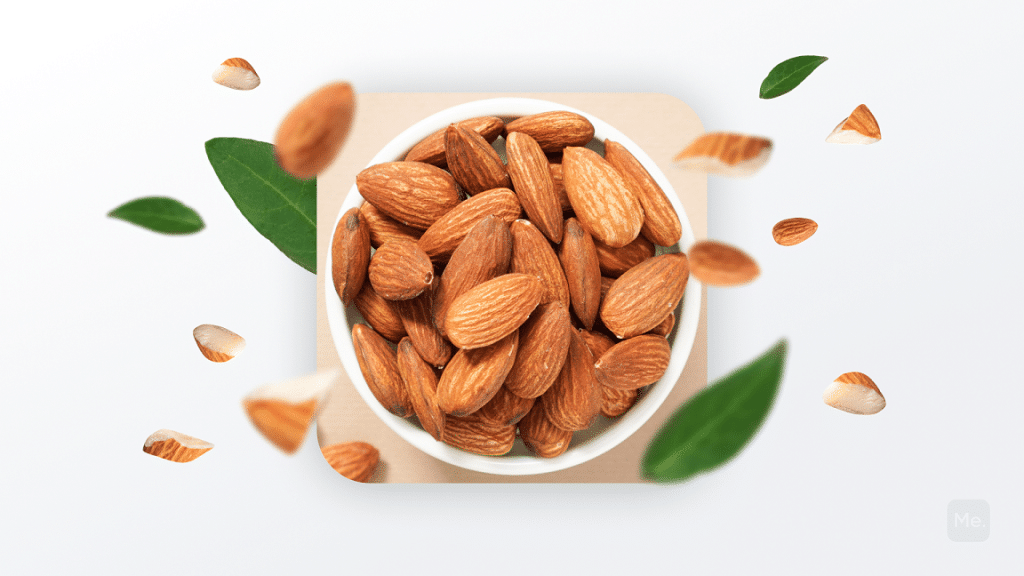Almonds are one of the world’s most popular snacks. They’re full of nutrients and quite flavorful. But what about the calories? It’s a fact that most nuts, including almonds, have quite a few calories. That said, if you’re trying to shed a pound or two, you’ll wonder whether or not to include these in your diet.
Get your personalized
meal plan!
The truth: almonds can be either a high-calorie or low-calorie food depending on how they’re prepared and eaten. If you want to know whether or not eating almonds makes you fat, this article will help clear up any misconceptions and confusion. Furthermore, we’ll look at other health benefits of these nuts, and how you can make them a part of a healthy diet.
Nutrition In Almonds
According to the USDA, almonds have the following nutrients per 1 ounce (28-gram) serving (3):
- Calories: 164
- Digestible carbohydrates: 2.5 grams
- Fiber: 3.5 grams
- Protein: 6 grams
- Fat: 14 grams (9 of which are monounsaturated)
- Vitamin E: 37% of the RDI
- Manganese: 32% of the RDI
- Magnesium: 20% of the RDI
- Copper, vitamin B2 (riboflavin), and phosphorus.
How Fattening Are Almonds?
Calories are more complicated than most people think. Calories are not created equal, but the exact difference depends on how you’re using them.
For example, the number of calories from a serving of almonds depends on whether you’re adding them as a snack or incorporating them as a replacement for a higher-calorie food.
If you’re replacing an almond-based dessert with a handful of raw almonds, your calorie intake will go down. This is because plain raw nuts have fewer calories than many desserts made with nuts.
On the other hand, if you eat regular almonds instead of celery sticks as a snack, then you’ll be adding calories to your daily total. This is especially true if most people who eat celery sticks are trying to lose weight and stick to lower-calorie foods such as fruit or vegetables. Knowing this, when it comes to losing or gaining weight, there are two factors at play here: Calories consumed and Nutritional value of the food you’re eating instead.
Almonds are quite nutritious, but they offer fewer calories for energy compared to other high-calorie options out there (4). The more nutritionally dense a food is, the less likely it will negatively impact you even if you eat a lot of it. However, this doesn’t mean that almonds are “fattening.” It depends on how you use them.
Read More: Are Roasted Almonds Healthy? The Tea On Raw Vs. Roasted Almonds
Can Almonds Help You Lose Weight?
According to most studies, almonds can help you lose weight in several ways:
Thermic Effect Of Food
Through the thermic effect of food (TEF). The TEF is a measure of how much energy your body uses up for digestion. It takes more calories to break down protein compared to carbs or fats, which is why eating more protein usually makes people feel fuller faster (1). Almonds have one of the highest-protein contents among nuts. The TEF of almonds is similar to that of other high-protein foods such as chicken.
Appetite Suppression
Protein tends to increase satiety, which makes your body feel full faster. This happens because protein takes longer for the brain to use and recognize in comparison with refined carbs and sugars. These high-protein snacks keep you feeling satisfied much longer than snacks higher in carbs and fats.
Research has shown that almonds can help people feel fuller on fewer calories as compared to low-fat snacks such as corn and celery chips. This is because dietary fats trigger hormones in the gut and brain, which reduce appetite and ultimately cause fewer calories to be consumed (6).
In one study, participants who ate almonds daily as snacks were less hungry and felt more satisfied than those who ate crackers or just had water (6). The more satisfied you are with your meals, the better it is for weight loss efforts because you’re less likely to snack or overeat later.
Lower Calorie Density
Since almonds have fewer calories per volume than other foods, they can help you eat less over time. For example, snacking on a 2-ounce bag of M&Ms makes it very easy to consume upwards of 500 calories in a single sitting. On the other hand, eating 24 whole unshelled almonds (roughly the same weight as those M&Ms) is fewer calories and provides more nutrients.
For these reasons, it’s not surprising that studies show that people who include almonds in their diet end up consuming fewer total daily calories compared to those who don’t eat this nut (8).
Low Glycemic Index
Almonds have a low glycemic index score, which means that although they still raise your blood sugar levels slightly after consumption, it does so slowly over time, not sharply. They also contain fiber, which helps prevent blood sugar spikes and weight gain (2).
If you’ve mustered up the courage to crush your weight loss goal, let Betterme take the sting out of this demanding process. Our app will help you restructure your habits, remold your life and crank up your fitness results!
Other Health Benefits Of Almonds
Almonds have other aspects that make them a nutritious choice for people trying to lose weight, including the following:
Low Cholesterol Levels
Through making dietary changes that increase good cholesterol levels and reduce harmful cholesterol levels. Almond consumption has been linked with increased HDL (“good”) cholesterol, lower LDL (“bad”) cholesterol, and reduced triglyceride concentrations (4).
A healthy ratio of HDL (good) cholesterol to LDL (bad) cholesterol decreases your risk for heart problems such as atherosclerosis. It also helps protect against sudden cardiac death, which can be caused by a disruption in blood flow due to plaque build-up in the arteries leading to the heart (4).
Improved Digestive Health
The high dietary fiber content in almonds helps one to regulate bowel movements, which reduces constipation and bloating. It also slows down nutrient absorption, which supports weight loss because it takes longer for the body to absorb calories from food eaten at an earlier meal (4).
Great Source Of Vitamin E
Eating nuts like almonds has been linked with reduced risk of coronary artery disease (CAD). This might be due to high levels of vitamin E, which acts as an antioxidant that reduces oxidative stress throughout the body. Antioxidants may also help protect against type 2 diabetes (4).
Richest Nutritional Source Of The Antioxidant Manganese
Manganese is a mineral that helps with DNA production and antioxidant defenses. Almonds contain 1,102 micrograms (mcg) per 100 grams, which is about 5 times more than other nuts such as pecans or walnuts. Healthy levels of manganese may help protect against age-related diseases such as arthritis and osteoporosis (9).
Supplies Several Important Minerals
Almonds contain high levels of phosphorus, copper, zinc, calcium, iron and magnesium. These minerals are important for various metabolic processes in your body to work well and keep you healthy throughout the years. Iron has been shown to increase energy levels and mental performance, while calcium helps preserve bone health (4).
Adequate intakes of calcium and magnesium have been linked with reduced weight gain and obesity. This may be because these minerals have a role in controlling blood sugar levels and insulin responses, which directly affects how much energy the body uses for muscle contraction and other daily activities (10).
Almonds May Improve Blood Sugar Control
Some researchers believe that almonds may help reduce insulin resistance and help control blood sugar levels. Insulin resistance is a condition in which the body produces insulin, yet doesn’t use it effectively. This causes too much glucose to build up in the blood, leaving you vulnerable to metabolic dysfunction and chronic inflammation (5). Metabolic syndrome is one of the most common conditions associated with this type of insulin resistance or pre-diabetes.
Read More: Almonds For Weight Loss: What Does Science Say?
May Increase Energy Levels
The high levels of manganese found in almonds may help restore energy levels. This is especially true when they are low due to mineral deficiencies caused by stress, illness or extreme conditions like malnutrition or anorexia nervosa (9).
Source Of Plant Compounds With Potential Health Benefits
The skin (or peel) of almonds contains several plant compounds that can boost your health. These include polyphenols and flavonoids, which have antioxidant properties that may help protect against oxidative stress induced by free radicals. Preliminary studies suggest that almond skin extracts (ASEs) might also have antioxidant and anti-inflammatory properties, making them beneficial for heart health as well (4).
Side Effects of Almonds
Almonds are considered safe for most people to eat. However, they have side effects you may wish to avoid including excessive calorie intake and allergic reactions.
Almonds are a good source of healthy fats, but it is important to be careful with your serving sizes. This is because their calories can add up quickly, which means you may not eat as many heart-healthy foods later in the day if you have a few too many almonds for a snack. A typical serving size should be about 1 ounce of almonds.
Some people experience an allergic reaction after eating almonds. This is usually caused by the protein found in them, which can cause an inflammatory reaction similar to pollen allergies or hives. If you’re allergic to one kind of nut, you should probably avoid eating all types of nuts.
How To Eat Almonds For Weight Loss
There are many ways to incorporate almonds into your weight loss diet plan. Here are a few ideas:
As An Alternative To Dairy Milk
Replace your regular dairy milk with almond milk. Not only is it dairy-free, but you can easily make it at home using a blender and strainer or cheesecloth. Almond milk contains nutrients that are essential for weight loss, plus it’s very satisfying on its own or in cereal, smoothies, tea, coffee and other beverages (7). If you buy it, choose unsweetened almond milk to avoid the added sugars.
For people with lactose intolerance, almond milk is a good option for curbing flatulence and other digestive discomforts.
As An Addition To Salads
Almonds are great as a snack on their own, but you can also try sprinkling them on salads instead of croutons or bacon bits. They provide protein, fiber, healthy monounsaturated fats, and various vitamins and minerals that help your body burn fat more efficiently (4). You can combine almonds with vegetables like carrots, celery sticks, broccoli florets, or cucumbers.
Whole, With Their Skin On
When you eat almonds, consider that the whole seed contains a large amount of fiber and protein. This makes them more satisfying for longer periods of time, which reduces unhealthy snacking between meals. Eating almonds with their skin on can also add extra fiber to your diet while preventing constipation and digestive discomfort (4).
Be careful when munching on these because it’s easy to overeat and consume too many calories without even noticing. A good way to limit how much you eat at a sitting is by serving a reasonable portion and keeping the rest out of reach. Eat them with dried fruit or small pieces of cheese to feel fuller.
Reasons why BetterMe is a safe bet: a wide range of calorie-blasting workouts, finger-licking recipes, 24/7 support, challenges that’ll keep you on your best game, and that just scratches the surface! Start using our app and watch the magic happen.
Roasted With Your Seasoning Of Choice
Spicy or sweet flavors can make almonds more tempting, which is why you should consider spicing them up before eating them. This can be done by coating them with honey, sugar or cocoa powder, then baking at a low temperature for about 15 minutes.
If your taste buds are on the saltier side of things, try seasoning them with garlic powder, onion powder, chili powder, curry powder or cayenne pepper.
If you’re trying to lose weight, you must be very careful about which seasoning you choose for your roasted almonds. While a little bit of salt won’t hurt, some spices contain high amounts of sodium and sugar. This includes commercial brands that often add other types of sweeteners you should avoid while counting calories.
To be on the safe side, go for natural seasonings like cayenne pepper, lemon juice, onion powder or garlic powder. If you want to indulge without the guilt it’s best to use sweet seasonings sparingly.
Almond Butter As An Alternative To High-Fat Spreads Or Butters
Replace peanut butter, sunflower seed butter or other spreads with almond butter. Almond butter can be used in sandwiches, on toast, celery stalks or apple slices. It’s also delicious when combined with low-sodium vegetables like tomatoes and cucumbers.
You can also mix almond butter with stevia for a tasty snack to eat throughout the day. You can either make your own butter by grinding up raw almonds in your food processor until creamy or buy unsweetened versions from health food stores.
Almond Meal Can Replace Wheat Flour In Certain Recipes
If you’re trying to lose weight, it’s important to avoid foods that may sabotage your efforts by adding too much sugar and unhealthy fats like trans fats. Make almond meal your go-to substitute for white flour when baking. Combine it with other ingredients like flaxseed, oatmeal or eggs for baked goods that will help you lose weight rather than pack on pounds.
The Bottom Line
If you’re switching to almonds from high-calorie foods or desserts, then yes, you can eat almonds to help lose weight. The same is true if you use them as meal replacements. Almonds for weight loss work best when you include them as part of a balanced diet. Almonds won’t help you lose weight just by eating them on their own or as an “extra” snack. You need to include them within your daily calorie needs, not add them on top of it.
DISCLAIMER:
This article is intended for general informational purposes only and does not address individual circumstances. It is not a substitute for professional advice or help and should not be relied on to make decisions of any kind. Any action you take upon the information presented in this article is strictly at your own risk and responsibility!
SOURCES:
- A high-protein diet for reducing body fat: mechanisms and possible caveats (2014, nih.gov)
- Almond consumption improve glycemic control and lipid profiles in patients with type 2 diabetes mellitus (2011, metabolismjournal.com)
- Almonds, unroasted (2020, usda.gov)
- Almonds (Prunus Dulcis Mill. D. A. Webb): A Source of Nutrients and Health Promoting Compounds (2020, nih.gov)
- Effects of diets enriched in almonds on insulin action and serum lipids in adults with normal glucose tolerance or type 2 diabetes (2002, oup.com)
- Evaluation of the Effects of Raw Almonds on Appetite Control: Satiation, Satiety, Hedonics and Consumer Perception (2019, nih.gov)
- Health Benefits of Almond Milk (2020, webmd.com)
- Is a calorie always a calorie? Not when it comes to almonds, U of T researchers find (n.d., utoronto.ca)
- Manganese (2021, nih.gov)
- The role of magnesium in clinical biochemistry: an overview (1991, pubmed.gov)













